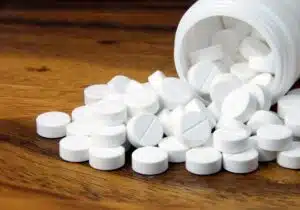Many people take oxycodone for a variety of reasons, and despite its effectiveness as a pain reliever, repeated use can lead to dependency or worse. Signs of abuse often begin innocently enough, with an individual taking the medication more frequently than necessary for their initial ailment. Addiction may start when the patient develops tolerance to the drug and starts increasing dosage levels in order to get relief from chronic pain or discomfort. Over time, some individuals struggle so much with addiction that they are unable to stop using without professional assistance in the form of prescription opiate addiction treatment.
It is important to understand that oxycodone dependency can happen quickly and is serious—but it’s also important to recognize that recovery is possible and treatment options exist. Experiencing an addiction to oxycodone can be a disorienting and frightening situation to find yourself in. Whether it’s through an injury that leads to a dependency on opioid pain relievers or the abuse of prescription opioids, it’s important to remember that you are not alone.
About Oxycodone
Oxycodone is a powerful opiate analgesic, often prescribed to treat moderate to severe pain. Popular brand names for certain prescriptions that contain oxycodone include OxyContin, Percocet, and Roxicodone. It is a Schedule II drug under the Controlled Substances Act, meaning it has a very high potential for abuse and addiction with potentially serious physical or psychological dependence. As with most opiates, oxycodone works by binding to opiate receptors in the central nervous system that responds to pain signals and activates areas of the brain that produce feelings of pleasure. This produces a sense of relief from pain as well as euphoria and relaxation.
The primary medical use for oxycodone is managing acute or chronic pain when other treatments are insufficient. Oxycodone may be used on its own or in combination with other over-the-counter drugs, such as acetaminophen or ibuprofen. It is important to note that oxycodone is a powerful opiate and can be habit-forming, so it should only be used as directed by a doctor.
Why People Take Oxycodone
People take oxycodone for a variety of reasons, and it can vary from person to person. For many, the most common reason to use it is to relieve pain, whether it is chronic or acute in nature. This opiate-based drug has been found to be an effective method of treating both short-term and long-term pain, thus making it a go-to choice among those who suffer from painful conditions.
However, the longer a person takes oxycodone, the more likely they are to become dependent or addicted. As the body builds a tolerance to the medication, more of it is required in order to achieve the same level of relief. The person may then start taking larger doses than prescribed or take it more frequently. This can lead to a dangerous problem that ultimately requires professional opiate addiction treatment.
What Is Opiate Addiction?
Opiate addiction is a chronic, relapsing disorder characterized by compulsive opiate use despite negative consequences. People with opiate addiction experience strong cravings for opiates to the point where other aspects of their lives become unimportant, and their drug use takes precedence over all else. The longer opiates are used, the greater the risk of becoming addicted and needing professional opiate addiction treatment.
Opiates like oxycodone can be very addictive due to their ability to produce a powerful feeling of euphoria as well as relief from physical pain or discomfort. This euphoric effect is often quite attractive to people who are seeking an escape from life’s everyday stressors or simply want to feel good without having to confront any underlying issues. With this in mind, knowing the signs and symptoms of opiate addiction is the first step toward getting help.
Signs of Opioid and Prescription Drug Abuse or Addiction
- Increasing dosages to get relief from chronic pain or discomfort
- Experiencing physical or psychological withdrawal symptoms when opiate use is stopped
- Becoming preoccupied with obtaining opiates and using them often
- Engaging in risky behavior while taking opiates, such as driving under the influence of drugs or engaging in unprotected sex
- Neglecting responsibilities at home or work due to opiate use
- Using opiates in combination with other drugs, such as alcohol or marijuana, to enhance the effects
Treatment Options Available
When addiction has taken hold of your life, opiate addiction treatment can help you take control back. Treatment should address not just the physical dependence on opiates but also any psychological issues underlying the addiction.
The journey toward recovery starts with getting help from opiate addiction treatment professionals. Depending on individual needs, various types of opiate addiction treatment programs are available. The most successful opiate addiction treatments usually include some combination of detoxification, medication management, counseling and therapy, support groups, and aftercare support services.
Oxycodone addiction is a pervasive, dangerous disease that often requires professional help in order to successfully turn your life around. If you or someone you care about is struggling with oxycodone dependence, know that resources and treatment options are available to help break the cycle of addiction and start on the path to recovery. Whether attended through an outpatient program or at an inpatient rehab facility, opiate addiction treatment can provide the guidance and structure necessary for lasting sobriety.
Effective Opiate Addiction Treatment in Chattanooga, TN
Opiate addiction doesn’t need to control your life. With proper support from professionals and an understanding of the different opiate addiction treatments available, individuals can find the right path for their recovery journey.
Iris Wellness Group provides comprehensive and holistic opiate addiction treatment in Chattanooga, TN. Our reputable counselors, therapists, and other professionals are committed to helping individuals break free from opiate dependence while providing a safe and supportive environment. We understand addiction can be overwhelming, but with the right opiate addiction treatment in Chattanooga, TN, it is possible to achieve lasting sobriety. Contact us today for more information about our opiate addiction treatment program and how we can help you take back control of your life.










